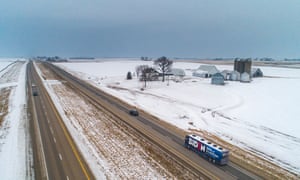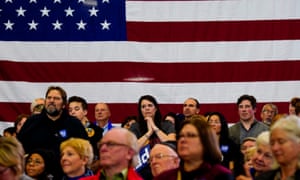Every four years, candidates flood the state, trailed by staff, media and global attention, to give a first indication of who might be president

Photograph: Jim Lo Scalzo/EPA
“Iowa: Wave The Next Time You Fly Over!” “Des Moines: Your mom says all your friends are moving back.” “Des Moines! From bone-chilling cold to tropical humid heat. We really do have it all!”
The slogans adorn fridge magnets, mugs, postcards, T-shirts and other ephemera at Raygun, a novelty retailer in Iowa’s state capital where giant letters on the wall declare, tongue firmly in cheek: “Des Moines: the greatest city in the universe.”
Welcome to Iowa which, for now at least, is the centre of America’s political universe. Intimate campaign events at diners, hotel ballrooms and school gyms in this unglamorous state are key to deciding who will become the most powerful individual on the planet.
On Monday evening, the Iowa caucuses will kick off the Democratic race to challenge Donald Trump in November’s presidential election.

Amid winter snow and ice, Iowans host these political Olympics every four years. Candidates flood the state to practise retail politics in its purest form, trailed by campaign staff, media crews and global attention. But why Iowa, a midwestern state with the same population size as Wales (three million), nine in 10 of whom are white? And what happens when the circus leaves town?
Raygun, and its sense of irony, have been owned by Iowa native Mike Draper, 37, since 2005. His wife, Laura Boggs, also 37, is a Brit, from Chelsea, west London.
With four children, and a house that cost $150,000, it has worked out for them. Draper said: “Our home is cheap, the schools are great and I have no commute. Des Moines is not necessarily on the cutting edge of anything but, at the same time, it’s extremely easy to live in.”
More time for Draper to come up with dryly humorous merchandise that skewers outsiders’ perceptions of the Hawkeye state. “We have one that says, ‘Des Moines: Let us exceed your already low expectations!’ That’s because you hear people say, ‘I came to Des Moines for a wedding and it’s not as bad as I thought.’ Oh, thanks, I live here!”
But now an army of candidates, staffers and journalists have descended on the state. Raygun sells a scented “Washington DC homesick” candle, T-shirts that say “Iowa 2020: We know they’re pandering to us & we love it!”, “America needs journalists” and “Hi, didn’t I interview you 4 years ago?” and books by defeated candidates with a sign: “The winners go to New Hampshire. The others go to our sale section.”
It is a fluke that Iowa, where until 1960 more people lived on farms and in rural areas than in cities, has the first say on who will command the world’s biggest economy and mightiest military.
After the 1968 Democratic National Convention in Chicago descended into mayhem, the party overhauled its presidential nomination process by spreading out the timetable in each state. In 1972, when political leaders in Iowa looked at their schedule, they realised they needed more time to get ready.
Michael Morain, spokesperson at the Iowa Department of Cultural Affairs, explained: “They plopped it on the calendar and it just happened to be first. Iowans didn’t ask for it; we weren’t trying to cut to the front of the line. A few reporters paid attention then, but it wasn’t really until 1976 that Iowa stepped into the spotlight.”
That was the year Democrat Jimmy Carter saw the Iowa caucuses – which are essentially neighbourhood gatherings – as an opportunity to build momentum and, for the first time, Republicans held their caucuses on the same date. But the parties continue to operate differently. Republicans hold more than 1,600 caucuses with a simple secret ballot.
Q&AWhat are the Iowa caucuses?

On 3 February, the midwestern state of Iowa will kick off the long process of choosing the Democratic party’s presidential nominee, who will take on Donald Trump in the US election in November.
Most US states hold primary elections, in which voters go to a polling place, mail in their ballots or otherwise vote remotely. But a handful of states hold caucuses – complicated, hours-long meetings with multiple rounds of balloting until one candidate emerges as victor.
Both Democratic and Republican caucuses will take place on 3 February. But because Trump doesn’t face any serious Republican challengers, all eyes will be on the Democratic contest.
Put simply, Iowans aged 18 and over who are registered with a party will gather in caucus sites (school gyms, churches, community halls) in their designated precinct, and vote with their feet by splitting into groups based on their preferred candidate.
Once voting is over at a caucus site, the support for viable candidates (those with more than 15% of the votes) is translated into a number of “state delegate equivalents”. That result is used to calculate the number of national delegates each candidate receives. National delegates eventually choose the nominee at the Democratic convention in July.
On the night, the candidate with the most SDEs is considered the winner.
Democrats’ more than 1,600 caucuses are more complex: voters can talk and debate before eventually moving to a space designated for the candidate of their choice. After a first count candidates who fall short of 15% are usually eliminated, then there is more cajoling and wooing and shuffling across the room, followed by a second count from which delegates are assigned.
Pat Kauffman, an Iowa resident, told National Public Radio this week: “We’ve had campaigns win people over by bringing in a dozen cookies and giving them away and say – come over to our camp and have some cookies and talk to us.”
Such is the magic of democracy. This year, polls suggest, former vice-president Joe Biden and Senator Bernie Sanders of Vermont are the favourites. But some eliminated candidates, such as Julian Castro, have questioned Iowa’s first-in-the-nation status given that, according to census data, 85% of the state’s population is white compared with only 60% nationwide.
Its defenders argue that Iowa is diversifying, especially in urban hubs such as Des Moines, and point out that it launched Barack Obama towards becoming the first African American president in 2008. Morain added: “What we have found from cycle to cycle is there are many candidates, like Cory Booker and Kamala Harris, who didn’t get a lot of traction in Iowa but they didn’t do much better in South Carolina, where the demographics are different.
“The issues that Iowans care about match pretty well with what people care about nationally. But there are some on which they have a laser focus, such as trade.”
Surveys of Iowa Democrats identified health care and the climate crisis as voters’ top two issues, followed by immigration and the economy. Climate has loomed large after a cycle of drought and flooding hit agriculture; Iowa is a leading producer of corn, soybeans, pork and eggs. Trump’s trade war with China also hurt its farmers.
But by Monday night, when results are coming in and as the candidates fly off to New Hampshire for the first primary of 2020, Iowa will be quickly forgotten.
Morain, who is a 40-year-old Iowan born and bred, reflected: “On February 4, when there is a mad dash to the Des Moines airport, people breathe a sigh of relief. There are no longer ads invading the TV. We stop getting the mailers. We can get on with our lives.”




